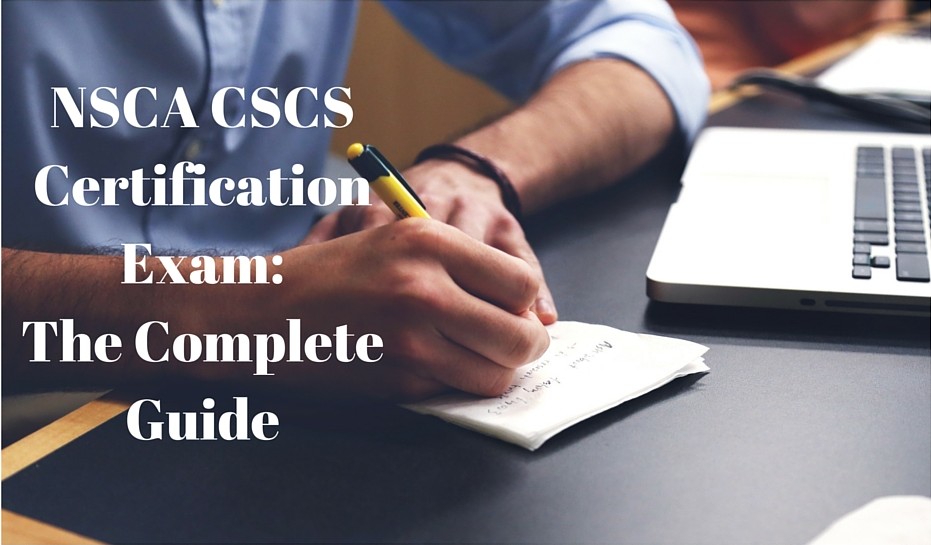
So you want take the CSCS exam and get certified by the NSCA? Congratulations, you've made a great choice. Unfortunately, depending on your experience level, it might not be such an easy thing to do. There is a reason it is perhaps the most respected cert among strength and conditioning coaches and personal trainers. It's not easy, and you won't pass if you don't really know your the necessary information.
I recently took and passed both sections of the exam to become a CSCS. I've been asked about my experience and preparation for the test several times since then, so I wanted to create this page as a resource and guide for those who are aspiring to become NSCA certified.
Included is information on how to find practice exams, free sample questions, study guides, flashcards, books, and other prep resources. There is also information on the test format, content, cost, and how to book your exam date. I'll also share with you my personal experience, preparation, and tips for the process. If you are looking for something specific, be sure to use the quick navigation below and jump to your section.
I make every effort to keep the information on this page updated (most recently September 2015), but if you are registering, I would check with the NSCA website.
Video overview
What is the CSCS Certification and what does it stand for?
CSCS stands for Certified Strength and Conditioning Specialist. It was created in 1985 by the National Strength and Conditioning Association (NSCA). As the name implies, these professionals are responsible for administering strength and conditioning programs.
According to the NSCA,
Certified Strength and Conditioning Specialists (CSCSs) are professionals who apply scientific knowledge to train athletes for the primary goal of improving athletic performance. They conduct sport-specific testing sessions, design and implement safe and effective strength training and conditioning programs and provide guidance regarding nutrition and injury prevention. Recognizing that their area of expertise is separate and distinct, CSCSs consult with and refer athletes to other professionals when appropriate.
People become CSCSs for any number of reasons. Individuals with this certification generally work with teams, sometimes as a collegiate or high school strength coach. They may also work with individuals or small groups in the private sector.
The main duties of a CSCS are the design and implementation of sport-specific testing and strength and conditioning programs. They can also provide general guidelines on nutrition and injury prevention, but are expected to refer out to other professionals when necessary.
For more information, you can download the official candidate handbook.
How do you get it and what are the prerequisites?
There are three required components to becoming certified:
- Have a bachelor's degree or higher from an accredited institution
- Maintain current CPR/AED certification
- Pass both sections of the exam
The bachelor's degree (or higher) must be from one of the organizations listed in the NSCA guidelines. You must submit an original and official copy of your transcript as proof. U.S. and Canada candidates can have them mailed to the address listed below. International candidates can send a photocopy of their transcript.
1885 Bob Johnson Drive
Colorado Springs, CO 80906
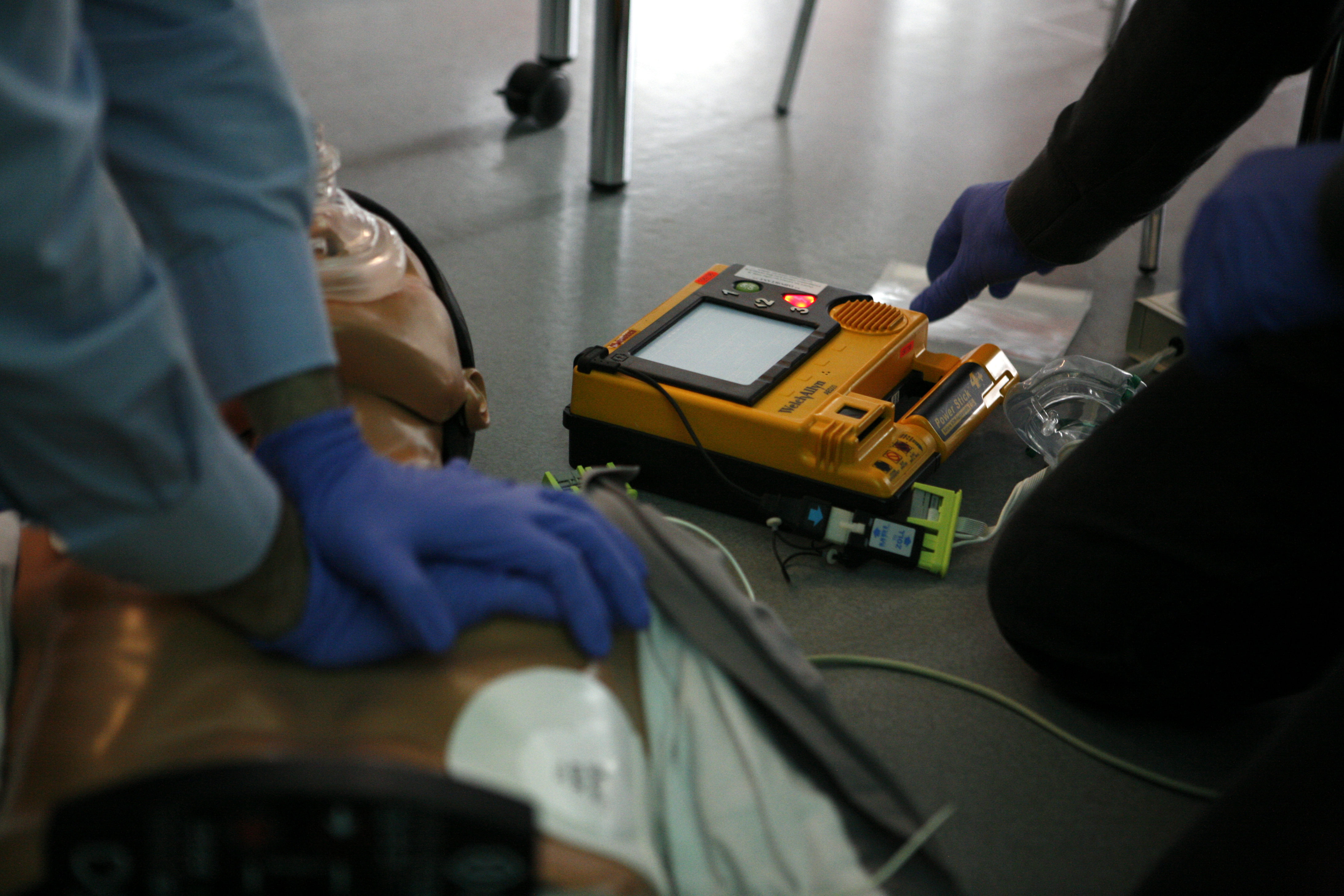
Photo from: wikimedia
The CPR/AED course cannot be an online-only course and it has to have a hands-on training component and a skills performance evaluation. Some of the accepted CPR/AEDs include the American Heart Association, Red Cross, National Safety Council, and St.John Ambulance. If you already have a CPR/AED cert with another organization, I'd contact the NSCA to see if it can qualify.
A copy of your CPR/AED certification can be mailed to the address above. It can also be scanned and emailed to [email protected] or faxed to (719) 632-6367. I emailed a copy of mine and had confirmation that it was received within 24 hours.
I'd recommended sending your transcripts and other documents at least a couple weeks before your scheduled test date. This way you won't have any hiccups with getting your test results. Generally, colleges and universities are pretty quick sending transcripts, but you never know when there will be an unforeseen delay.
You can still book a test without having all the prerequisites fulfilled. You can sit for the exam as long as you are enrolled as a college senior. You also don't need to have a current CPR/AED. However, the NSCA won't release scores or give you the official certification until it has received all required documentation. Also, if you haven't submitted everything within a year of taking the exam, your results will be voided.
Certification exam cost
The registration fees for the exam are listed below. As you can see, it is much less expensive if you are an NSCA member. If you are enrolled in college full-time, you can get an NSCA student membership for $65/year. Anyone else can get a professional membership for $120/year. You can find out more about membership here.
While you don't save a huge amount this way, a professional member can save about $15 dollars by becoming a member before registering for the exam. Student members can save $70 on the total cost of the exam this way. Membership of the NSCA also has several other benefits. It's important to note that associate members do not qualify for discounts.
| Student or Professional Member | Associate or Non-Member |
|---|---|---|
Registration | $340 | $475 |
Retake Both Sections | $340 | $475 |
Retake One Section | $250 | $385 |
Test format and contents

Photo By: Marcie Casas
CSCS exams are now handled through Pearson VUE. They offer computer-based exams at locations throughout the country. I had several options within a short drive from my house, including a college library a few miles away.
There are two sections to the exam: Scientific Foundations and Practical/Applied. You must pass both sections. You have 1.5 hours to complete the Scientific Foundations portion and 2.5 hours to complete the Practical/Applied portion.
All questions on both parts of the exam are multiple-choice. The practical/applied section includes 30-40 video-based questions.
The Scientific Foundations section covers exercise science and nutrition. This includes anatomy, physiology, biomechanics, and more. There are 95 questions on the Scientific Foundations section, of which 15 are non-scored.
Scientific Foundations | Percent of Exam | Number of Questions |
|---|---|---|
Exercise Science | 74% | 59 |
Nutrition | 26% | 21 |
Non-Scored | - | 15 |
Total | 100% | 95 |
The Practical/Applied section covers exercise technique, program design, organization and administration, and testing and evaluation. There are 125 questions on the Practical/Applied section, of which 15 are non-scored.
Practical/Applied | Percent of Exam | Number of Questions |
|---|---|---|
Exercise Technique | 35% | 38 |
Program Design | 35% | 39 |
Organization & Administration | 12% | 13 |
Testing & Evaluation | 18% | 20 |
Non-Scored | - | 15 |
Total | 100% | 125 |
Tables adapted from http://www.nsca.com/CSCS_Certification_2/.
The non-scored questions do not impact your score and are randomly inserted in your exam. They are used for a few reasons, such as sampling potential questions for future tests.
I finished the first section of my exam early and was offered a 15 minute break. I could take less if I wanted, and could get started with the second part whenever I was ready.
How to register and book your test date
You'll first need to register for an account with the NSCA, if you don't have one. Then, you can register and pay the fee for the exam. As I mentioned earlier, you'll save a some money if you become a member of the NSCA when you are registering, as you'll get preferred pricing.
I recommend waiting until you are ready to take the test before registering. You don't need to know the exact date you want to sit for the exam, but you only have 120 days from registering to actually take it. You can extend the time period for another 120 days, but there is a fee ($100).
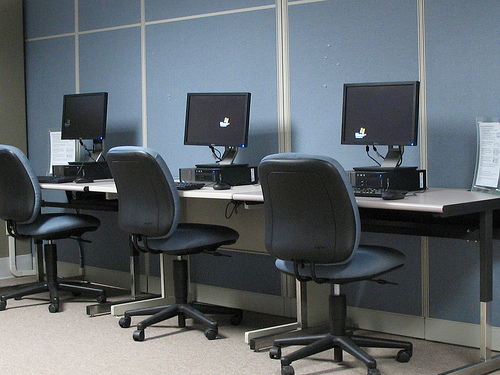
Photo By: Marygrove College Library
Within a few days of registering, you should get an email from Pearson VUE about how to schedule your exam. They might be faster now, but when I registered they were in the process of switching over to Pearson VUE and the move hadn't been finalized yet.
You can register for the test at this link once you have received confirmation that you can schedule. You can find available test centers here. The experience registering and scheduling with Pearson VUE was quick and painless for me.
It's recommended that you show up to your test center about 15 minutes early. This way, you can go through the paperwork and get your identity verified with your photo ID and getting a headshot taken. As long as the center isn't busy, this should only take a couple minutes and then you'll be ready to get started. If you schedule for a busy time, like Saturday morning, you may wanna get there a little bit early.
Required and recommended books
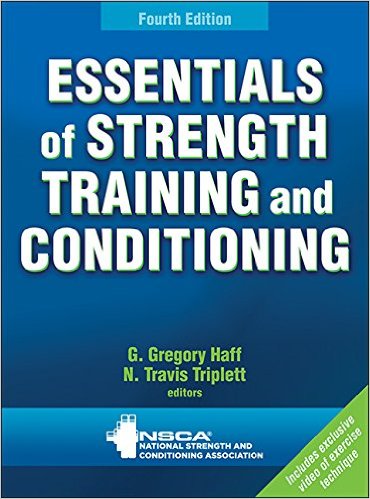
Essentials of Strength Training and Conditioning - Recommended by the NSCA
Update: now on its 4th edition. This is the official book to get and pretty much required reading. Basically, everything you need to know is included in here. It's a long and difficult read, particularly anything that is new information to you. You can rent it for a few months on Amazon for a reasonable price, but I bought one, as it can be used as a reference for years to come.
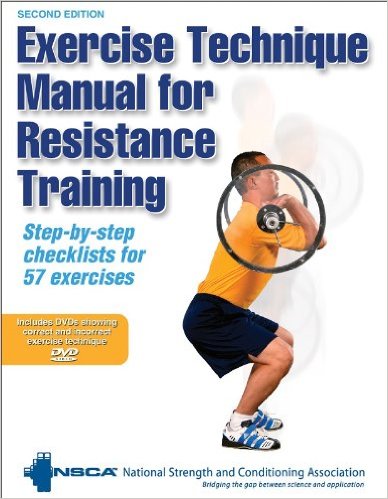
Exercise Technique Manual for Resistance Training - Recommended by the NSCA
As the name implies, it breaks down a bunch (57) of exercises. It comes with a DVD demonstrating the exercises. This is very helpful for the video questions you'll have on the practical/applied section. Again, you can rent it for cheap on Amazon, but you may want to buy a copy to keep as a reference.
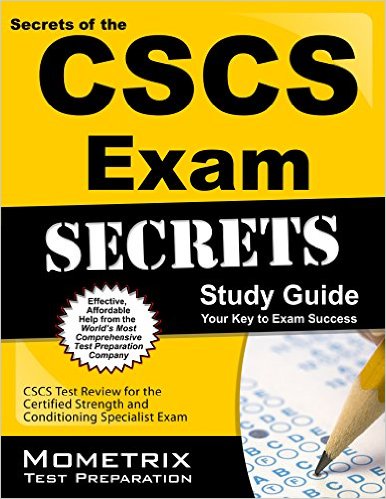
Secrets of the CSCS Exam Study Guide: CSCS Test Review for the Certified Strength and Conditioning Specialist Exam - Recommended
You won't learn everything from this book, but it is packed with definitions and helps understand the major concepts. There is a practice exam included that is very helpful and explains why answers are correct. I got an older edition of this that probably wasn't as helpful as the new one.
Practice questions and exam - free and premium
The NSCA sells practice question bundles on their website. I've heard they are pretty awesome, but I didn't use them personally as I thought I had sufficient practice questions from other sources.
I used the awesome Pocket Prep app for practice questions. It comes with 30 free questions, so it's worth giving it a shot. I liked it so much that I bought the premium version (around $12) that gives access to over 600 questions. You can take as many practice questions as you'd like and test individual sections or all sections. I took a bunch of 25 question tests because they were quick and I got instant feedback on what sections I was doing well or not. The explanations leave a lot to be desired, but overall I really enjoyed the app.
I also used practice exams from the Human Kinetics course that I talk about below, and the CSCS exam study guide book that I talked about above.
Study guides
There are a handful of study guides available out there, but I don't have experience with all of them. I used the guide listed below. I certainly wouldn't suggest using only this guide, but it is good supplementary reading with a really good practice exam.

This was also listed under books above. It is good overview of information and definitions and comes with an awesome practice exam.
Flashcards
I ultimately never used flashcards very much, although I know many people love them. If you want to try flashcards, I would first try the free CSCS Flashcards app by BH Inc. I downloaded it and tried to use it a few times, but I didn't find it very user-friendly and I quickly gave up on it for other review items. It has pretty good reviews and I can honestly say I didn't give it a fair shot, because I don't love flashcards. I would definitely give it a try if you enjoy reviewing that way.
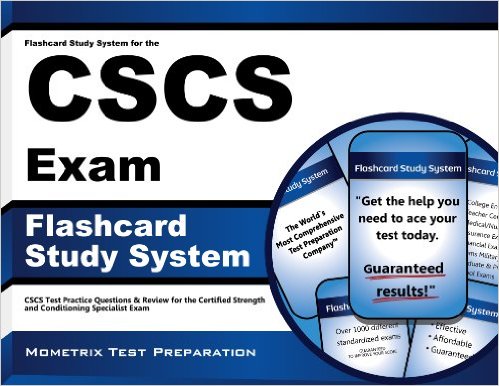
Flashcard Study System for the CSCS Exam: CSCS Test Practice Questions & Review for the Certified Strength and Conditioning Specialist Exam - I did not use this, but it is put out by Mometrix Test Preparation, which makes a lot of test review materials. It only has two reviews as of this writing, so I'm not sure I would give it a try, as it is pricey.
Online training course
Human Kinetics has the only online training course for the CSCS exam that I am aware of. They have multiple options for the course, including course-only, course with book, and course with e-book. You can read my review of the course here.
I signed up for the class and made the mistake of trying to go through the course without having read the book. The first part of the course were very challenging.
After I went through the book, the course was significantly better. It actually made sense and was a very beneficial review. Because the course is made in conjunction with the NSCA, it probably is the best review option other than their live clinics.
It is a pricey course, but ultimately I thought it was worth it. You'll be able to see exactly what the NSCA is looking for and was particularly helpful with exercise analysis videos and the practice exam at the end, which mimics the real test. I suggest going through the material at least twice before taking the course exam. Once you pass the course exam, you will loose access to the review portion.
Other preparatory study materials
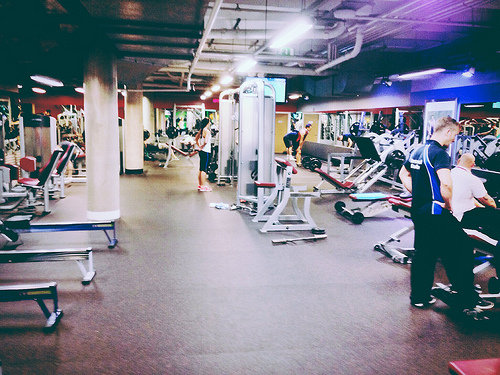
Photo By: Health Gauge
Supplementary studying is absolutely crucial, depending on your background. Everyone's experience and education level is different and I can't give you a great recommendation without knowing your background.
If you come from an exercise science background and have training and coaching, you may not need much supplementary studying. You should still read through the text book at least once or twice and take some practice exams. You'll need to do this to at least understand what the NSCA is looking for in answers. Remember, they want to know the best answer based on their standards, not your opinion. If reading the book comes off as review for you and you are acing your practice exams, you should be ready to book your exam.
If you are comfortable with exercise science, but have little to no training or coaching experience, you'll need to focus on the practical/applied section. Generally speaking, if you have personal experience with resistance training and program design, you should be able to learn the practical/applied section rather easily. If the thought of demonstrating a box jump, for instance, scares you, then you'll really need to focus on this section. If you can get some resistance training experience, even by training yourself, that will help. You can also research specific concepts and terms you are struggling with.
I came from a background with significant resistance training experience, but little formal exercise science education. I was all self-taught in those areas. For me, the practical/applied section came easier and I just needed to learn the specific NSCA recommendations and guidelines. For getting more comfortable with the anatomy and physiology portions, the free video-based Khan Academy course was great.
Some of the best free supplementary resources include:
- Khan Academy course for Human Anatomy and Physiology - If you know nothing about anatomy, you may want to start here. I went through this course and focused on the circulatory system, respiratory system, nervous system, muscular system, skeletal system, and endocrine system and ignored the rest. This might not give specific answers for the test, but for me it was invaluable in understanding the basics of how the human body works. The text book was much easier to get through after taking this course.
- YouTube Videos - There are actually some decent videos out there if you are looking for help on a specific concept or term. Look for reputable sources, and I would only use the information as an introduction before reading the book. Tip: you can adjust the playback speed of YouTube videos, which is very handy when reviewing concepts you are already comfortable with.
- iTunes U - There are entire college courses out there for free to listen to. The quality varies widely, but again, you can find background information on topics such as exercise science, human anatomy and physiology, kinesiology, and biomechanics. If nothing else, they can give you an audio guide to listen to when you get a chance. I downloaded a few courses, put them on my phone and used a variable speed audio app to listen at double speed. That helped getting through the courses in a reasonable time.
The NSCA offers live review clinics. You can check if there is one available in your area. I wasn't able to attend one, so I can't give an opinion of them, but considering it is put on by the NSCA I'd guess it would be very helpful. They offer clinics between one and three days long at locations throughout the United States for a fee.
How hard is it?
This shouldn't come as a surprise to you, but I'm going to say that it entirely on your experience and education levels. It is certainly considered more challenging than most personal training or similar certs out there.
Even if you have specific experience in exercise science and strength and conditioning, it won't necessarily be easy. You'll still have to learn the NSCA terminology and way of doing things. They aren't looking for your opinion on how to train athletes. They want to know the best way based on their guidelines.
It might sound boring, but the best way to tell how well you are understanding the information is by how easy it is to get through the Essentials of Strength Training and Conditioning book. If you read through and have no idea what you just read, you are probably in big trouble for the test unless you read through more times. If you can get through the book pretty easily and do well on the practice exams, you should be in good shape.
The pass rates are not very high and more than 40% fail the test. It's important to note that the test is certainly not impossible if you prepare properly. Some of the information was very challenging to me at first, but after reading through a couple times, it became ingrained enough that I wasn't worried about the test.
How I prepared

Photo By: Scott Akerman
When I registered for the exam, I had the best of intentions. I had 120 days to actually book my test date, which gave me plenty of time to follow the most pristine study plan I could imagine.
Guess what happened? Life got in the way and those 120 days quickly dwindled with little studying getting done. For me, I had to actually schedule the exam to start studying seriously. I finally took the test with seven of my 120 days to spare after a crash course on everything I needed to know.
For the record, I don't recommend this. Although you can extend your Pearson VUE exam date, assuming you have days left, as long as you give 24 hours notice, I wouldn't plan on that. You should only schedule your exam if you are really ready to take it. You know your knowledge and test abilities better than I do, so use your best judgement.
To me, the most beneficial items were, in order:
- Read through Essentials of Strength Training and Conditioning twice and a third time for parts I struggled with.
- Go through the Human Kinetics Course twice and take the practice exam.
- Use the Pocket Prep app to take several practice exams and make note of areas I struggle with.
- Take the free Khan Academy Course for human anatomy and physiology for the sections that relate to the test.
- Search for YouTube videos for any specific terms or concepts I was struggling with.
Following my practice strategy certainly does not guarantee success for you. We all come from a unique experience and educational background.
If I was taking the test again, this is what I would do:
- Read through the book from cover to cover
- Go through the online training course without taking the exam
- Take other practice exams, making note of the the categories I struggled with most
- Search for other supplementary information on the areas I struggled with
- Repeat until I am comfortable with all information and easily passing each section of practice exams
- Take the Human Kinetics course final test
- Review any remaining concepts that I struggled with before taking the exam
This review schedule might not work for everyone, but I think it gives you a great chance. You should be confident as long as you are doing well on the practice exams and the reading gets easier and easier.
Renewal and continuing education
The NSCA certification renewals are done in three year periods. This period is the same for everyone. The current time frame is 2015-2017. That means you must meet the required continuing education units (CEUs) and report them by the end of 2017. There is also a renewal fee that needs paid.
The table below shows the number of CEUs you must get based on when you became certified. If you were certified on or after July 1, 2017, you don't need to do any continuing education for the 2017 period.
You must get CEUs from a minimum of two of the following four categories for each renewal period:
- Category A - Official NSCA events, such as clinics and conferences
- Category B - Related to NSCA webinars and articles
- Category C - Relate college coursework and AED/First Aid renewal
- Category D - Other certifications or home study courses
Certification Date | CEUs Required | Category A Maximum | Category B Maximum | Category C Maximum | Category D Maximum |
|---|---|---|---|---|---|
Before 2015 | 6.0 | 5.5 | 4.0 | 5.5 | 3.5 |
During 2015 | 4.0 | 3.5 | 2.5 | 3.5 | 1.5 |
During 2016 | 2.0 | 1.5 | 1.0 | 1.5 | 1.0 |
1/17 - 6/17 | 1.0 | 1.0 | 1.0 | 1.0 | 1.0 |
7/17 - 12/17 | N/A | N/A | N/A | N/A | N/A |
It's important to keep up-to-date and report your CEUs before the end of the recertification period. If you let your cert lapse and want to get it back, you will have to go through the process of passing the exam again unless you qualify for a hardship, such as a documented disability or military deployment.
For updated recertification and continuing education information, visit here.
NSCA Contact Info
You can call the NSCA toll-free at (800) 815-6826 between 8 and 5 MST on Monday through Thursday and between 8 and 4 on Friday. If you have any questions, you can email them at [email protected]. That is also the email you will use to send them a scanned copy of your CPR/AED card. You can also fax the copy to (719) 632-6367.
You'll need to have your official transcripts sent to their address:
1885 Bob Johnson Drive
Colorado Springs, CO 80906
Alternative certifications
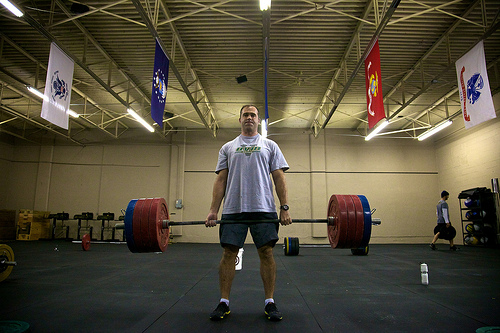
Photo By: Travis Isaacs
If you are looking for personal training certifications, there are a bunch, including the NSCA-CPT. Personal training certs are generally more geared towards non-athletes and individual or small group training. ACE, NASM, and ACSM are among the many personal training options out there.
Strength and conditioning certifications are a little more rare, but there are a couple.
- Strength and Conditioning Coach Certified (SCCC) - This is a new comprehensive cert by the Collegiate Strength and Conditioning Coaches Association that requires either 12 years of experience or a 640 hour internship, among other requirements.
- ISSA Strength and Conditioning Certification - The ISSA is pretty well-respected, but I don't know much about this cert. You would need to take this and their level two course to fulfill the NCAA strength coach requirements.
There are many more courses out there, but they are generally more specific in nature and are either sport-specific or add-ons to personal training certifications. Here are all the different strength and conditioning certifications.
Closing thoughts
While I tried to make this guide as complete as possible, I may be missing your specific question. If so, just leave a comment below and I'll get back to you as soon as I can. Best of luck on your strength and conditioning career!
